A sort of photographic antithesis of Bobby Moore’s post shirt-swap embrace with Pelé in 1970, it is one of the iconic World Cup images. Four years after the photograph was taken, it was further seared on the collective football consciousness when the author and journalist Simon Kuper used it to illustrate the cover of his award-winning bestseller Football Against The Enemy. Kuper would later regret doing so and apologised to one of the players featured in the photograph on the grounds that it was probably unfair to highlight such an unseemly act when it had been perpetrated by somebody for whom such behaviour was so utterly out of character.
The snap in question? Rudi Völler standing in thoughtful meditation with his hands on his hips in the immediate aftermath of one of the most unjust dismissals in World Cup history, while over his right shoulder, his Dutch rival Frank Rijkaard looks to be inspecting the massive grolly he had just violently expectorated and left dangling from the back of the German striker’s bubble perm like a Christmas tree bauble.
“If I spit they will take my spit and frame it as great art,” Pablo Picasso once said. Rijkaard’s flob into Völler’s head may have been a masterpiece of a fairly unpleasant genre but was never heralded as great art. It did, however, contrive to make global headlines, earning the defender the nickname “Llama” in honour of the South American camelid’s prodigious ability for hurling projectiles manufactured from saliva. It was an uncharacteristically vile act performed by a man almost universally held in the highest of regard and one for which he later apologised. Völler accepted Rijkaard’s mea culpa and the incident was later put to bed when the pair agreed to break bread – and spread butter – together for a TV commercial, with both their fees going to charity.
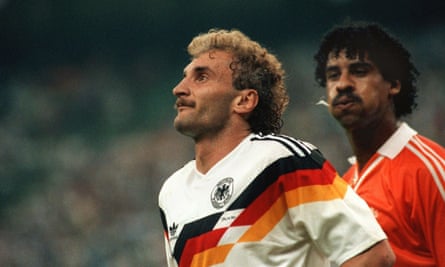
The rivalry between Holland and West Germany, as they were then known, was and remains notoriously fierce. Its roots are in the second world war and the mutual loathing of both teams and sets of fans intensified after “The Mother of all Defeats”, when the Germans famously triumphed over the Dutch in the 1974 World Cup final.
At the 1980 European Championships, the German goalkeeper Toni Schumacher was assaulted by the Dutchman Huub Stevens in another German victory, while the Dutch exacted some measure of revenge eight years later, when Marco van Basten sent Holland through to the final at Germany’s expense on a night when his team-mate Ronald Koeman enraged German sensibilities by pretending to wipe his backside with Olaf Thon’s shirt. The following year they were further incited during a qualifier for Italia 90 in Rotterdam, when Dutch fans unfurled a giant banner comparing the German captain, Lothar Matthäus, to Adolf Hitler. One did not need to be a rune-reader to predict their meeting in the second round of Italia 90 was likely to be spicy.
Like most matches between West Germany and the Netherlands it was a bad-tempered affair. Having topped Group D ahead of Yugoslavia and Colombia in second and third place, Völler and his team-mates, who would go on to win the match and the tournament, had earned a berth in a decidedly tricky second-round eliminator against their old foes in Milan’s San Siro. The format of Italia 90 meant the top two teams in each of the six groups progressed to the second round, where they were joined by the four best third-placed teams from the group stages. With Ruud Gullit and Mick McCarthy having agreed, with 20 minutes or so to go, to play out a draw in their final group game at Palermo’s Stadio La Favorita to shaft Egypt and ensure they both went through, the Dutch and Jack Charlton’s Republic of Ireland finished with identical records behind England in Group F. It was the Dutch who drew the short straw that pitted them against Germany, while the Republic of Ireland advanced to play against and beat Romania.
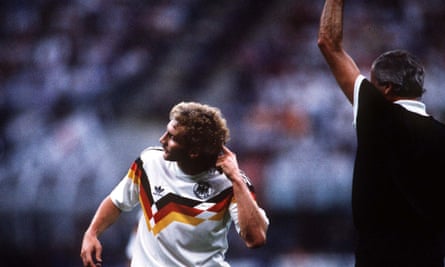
“I’m just finding it in a way a little bit disappointing that Frank Rijkaard, who is also such a talented player, seems today to have such a negative role, just looking after [Jürgen] Klinsmann,” said the ITV commentator Brian Moore, as the clock ticked towards the 20-minute mark. A moment later the subject of Moore’s disappointment “looked after” Klinsmann’s strike partner Völler, putting a stop to the fleet of foot striker’s gallop with a scything challenge on the inside-left channel, halfway inside the Dutch half.
The challenge earned Rijkaard a booking from the Argentinian referee, Juan Carlos Loustau. It was his second of the tournament and meant he would miss the quarter-final should Holland progress. Maddened by his entirely deserved punishment, Rijkaard was enveloped in red mist and, as he jogged past Völler to take up his position for Andy Brehme’s free-kick, he spat in the German’s carefully coiffured mullet. Verbals between the pair ensued, at which point Loustau booked Völler, ignoring the German’s incredulity and accompanying invitation to examine the gobbet of spittle that had recently been deposited in his hair.
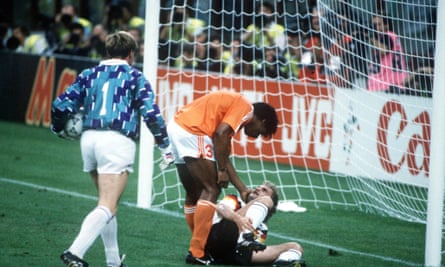
With order of a sort restored and the Germans ambling into the penalty area for the as yet untaken free-kick, Völler appeared to explain to his strike partner Klinsmann that he had been spat at, then took up his position. Floated into the area by Brehme, the ball was nodded towards the edge of the six-yard box, where the goalkeeper Hans van Breuckelen grabbed it, having dashed off his line to do so. Having followed in to contest the ball, Völler appeared to do all he could to avoid clattering Van Breuckelen in mid-air but an incensed Rijkaard attempted to drag Völler to his feet by the ear, then stamped on his foot, prompting the German to fall to the ground.
With Van Breuckelen and Klinsmann valiantly attempting to act as peace-makers, Loustau promptly brandished his red card in the direction of Rijkaard, before turning and showing it to Völler too. The hard done by German could scarcely have looked more appalled and to this day remains mystified by the official’s decision to issue him with his marching orders.
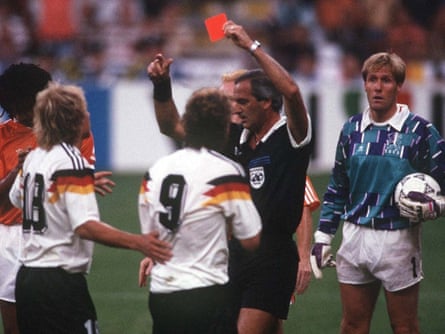
“Of course it wasn’t nice what Frank Rijkaard did but the match should have continued for me,” he said years later in an interview with FourFourTwo magazine. “I still can’t understand why the ref sent me off and I guess he will take it to his grave. He wanted to make an example of both of us so that the situation would calm down – which did work. There was some venom before between other players but, you know, it’s always problematic between Germany and Holland.”
With Völler standing there stoically pondering the injustice of it all, Rijkaard was lurking in the background, studiously clearing his mucous membranes by hoiking up the mother of all grollies. As he walked past Völler en route to the dressing room, he casually turned his head and flobbed the mouthful of slimy gloop he had just harvested from his nasal turbinate straight into his rival’s hair. Völler’s head snapped to the right as he glared at his opponent, then rubbed his hand through his curls in an attempt to locate the offending phlegm, which could be seen dangling from the back of his head. As Rijkaard was being escorted up the touchline towards the dressing rooms by a Dutch team official, Völler broke into a jog, looking for all the world as if he might attack his saliva-spewing assailant and prompt all hell to break loose. Rather disappointingly he chose to be the bigger man and merely cantered past his rival without so much as a sideways look.
“Spitting is universally recognised as perhaps the ultimate degradation and it’s bound to result in rather aggressive retaliation,” mused the consultant psychologist Dr Aric Sigman years later, in some nostalgia-based clip show or other. Dr Sigman may well be right but rather intriguingly Völler proved the exception to the rule by refusing to retaliate in any way, aggressively or otherwise, bearing his multiple punishments and degradations at the hands of both referee and opponent with a stoicism that bordered on the truly heroic.
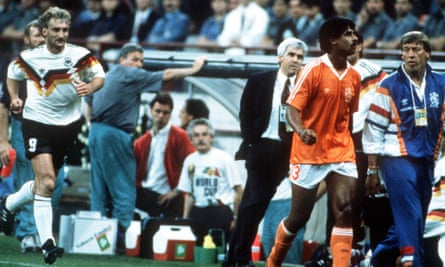
“And now, an absolute sensation here in Milan,” declared Moore on ITV, as both footballers left the arena. “One that will do little for the game, I have to say on the night. Both sides reduced to 10 men ... Völler running off to the dressing room, Rijkaard taking a more leisurely pace. And as they went past, there was even a possibility Rijkaard may have spat at Völler, but the place is in uproar now.”
On Irish television the incident was replayed time and again, mainly for yuks and giggles. As RTE ringmaster Bill O’Herlihy tut-tutted in a fatherly and faux po-faced fashion, pundit Eamon Dunphy got to work with his new toy, an electronic pen with which he could enhance and illustrate his analysis by drawing white lines, circles, arrows and squiggles on a monitor after pausing the VT with an often aggressive roar of “Stop it there!” at some unseen flunkie in the production suite.
It was a technological advance Dunphy would use to comical effect some years later, pausing the action during a highlights package featuring Wimbledon to draw a large circle around John Hartson’s ample buttocks and declare “that is not the arse of a £7m player”. On the night Germany beat the Dutch, his analysis of the incident was peerless and priceless. “Rijkaard launches the spit from here, now stop it there,” he observed, before getting to work with his magic pen and charting the trajectory of the offending gully with an illustrative squiggle. “There it is, Bill. It’s hitting his head there and that’s bad news for Rudi Völler and even worse news for his hairdresser!”
Meanwhile on the BBC, a completely farcical turn of events was being treated with the utmost gravity. “Please, parents, turn the videos off now because that is just absolutely scandalous,” intoned Ray Wilkins solemnly, considerately thinking of the children but paying scant regard to the ratings.
Writing about the spitting incident in his book Tor! The Story of German Football, the German journalist Uli Hesse-Lichtenberger pointed out that Rijkaard and Völler were not exactly strangers. “[Rijkaard] knew Völler from Italy and both men respected each other,” he wrote. “Five months later, when Milan played Roma, Rijkaard apologised and said he’d lost his head, explaining he’d been under emotional pressure, having separated from his wife shortly before the World Cup.”
In a subsequent interview with Simon Kuper Rijkaard was quick to accept all the blame for the incident and equally quick to put paid to suggestions that Völler might have insulted or even racially abused him. “That day I was wrong,” he said. “There was no insult. I always had much respect for Rudi Völler. But I went berserk when I saw that red card. I talked to him after the match and I apologised. I’m very happy that he accepted. I have no bad feeling about him now. We even posed for a very funny advert together years after.”
The advert in question was for butter and featured both men sporting wide grins, cream dressing gowns and their trademark (but mercifully saliva free) curly hairstyles while seated at the breakfast table. “A Dutch butter company came up with the idea of a public reconciliation under the slogan ‘Everything In Butter Again’, which is a German proverb meaning that everything is OK again,” said Völler. “The fee was donated by both of us to charity, otherwise I wouldn’t have joined in.” In a rather undignified but amusing manner dignity had finally been restored.
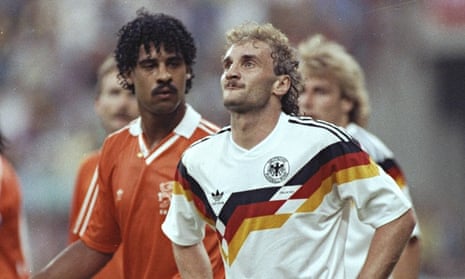
Comments (…)
Sign in or create your Guardian account to join the discussion